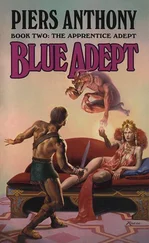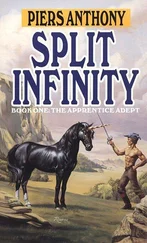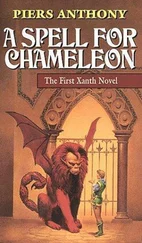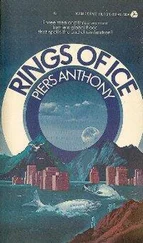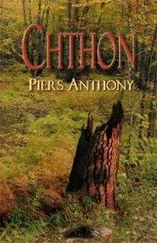“Peace, Plint.”
Was this creature laughing back at him? What did the human form resemble, to the alien perception? A bundle of vine splinters? Flint became intrigued. “I go to a dinosaur hunt. Would you like to accompany me?” In one sense, this too was protocol; Polarians liked to be included in activities. But they were appropriately wary of dinosaurs.
“I would be gratified,” the teardrop said.
Now he had done it! He had never suspected the creature would accept! Well, it couldn’t be helped. “It is an emergency. We shall be hurrying.”
“I shall not impede you,” the Polarian replied.
Fat chance! But Flint smiled graciously. He gestured to the boy. “Show the way.”
The runner was off, sensing a race. This was firm, level ground, excellent for making time. Flint followed, stretching his legs.
But Tsopi followed right along, rolling smoothly on her ball-wheel. She was at no disadvantage. Polarians could move rapidly and effortlessly when the terrain was right; their wheel was efficient. Flint had not before appreciated how efficient. On occasion he had wondered how the aliens kept themselves upright. The Shaman had remarked that a man on a unicycle performed the same feat. But there were no unicycles on Outworld.
Then they came to a ravine. One vine crossed it. The boy leaped up, caught a trailing sprout, and hauled himself topside. Flint started to follow, then paused. The Polarian could never make that leap.
“Permit me,” Flint said, extending his linked hands. He had heard of this kind of cooperation, and was curious to see if it worked.
The Polarian looped her trunk around the hands. It was warm; the body temperature was similar to man’s. Flint braced himself and heaved up, hauling the entire weight of almost two hundred pounds into the air. Then he swung—and the torso of the creature bumped against the underside of the vine.
Instantly the trunk disengaged from his hands and whipped about the vine. The bottom wheel spun against the bark, shoving the torso up. The entire body elongated momentarily; the aliens had no bones. In a moment, by a splendid feat of acrobatics, the Polarian stood upright atop the vine, ready to move on.
Flint hauled himself up, and they proceeded, running single file across the chasm. Purple mud bubbled far below; trash was disposed of here, for what dropped into that mud never reappeared.
The vine trailed near the ground on the far side, so the Polarian needed no help. Actually, Flint realized, she could have used a small ramp to hurl herself a few feet into the air at speed, high enough to catch the vine with her upraised tentacle. His assistance had merely facilitated things.
A mile farther along Flint heard the noises of an enraged dinosaur. “Trouble, all right!” he gasped, and tried to run faster. But he was winded.
Tsopi rolled up beside him, effortlessly. The tentacle touched the ground. “Permit me,” she said. Then the trunk reached over, circled around Flint’s waist, and tightened elastically. In a moment he was lifted into the air, head forward.
Then Tsopi accelerated. Faster than any man, she zoomed across the plain, carrying Flint like an elevated javelin. Thirty miles an hour, thirty-five, forty—the wind whistled past his ears and forced his eyes and mouth closed. No wonder the Polarians had no such organs; they were unusable at this velocity. He held himself perfectly rigid, knowing that any upset in the alien’s balance would be disastrous.
In moments they were at the scene of action. Tsopi slowed and set him down. The runner was far behind.
“Thanks, Topsy,” Flint muttered, not entirely pleased at this demonstration of the alien’s superior ability. But he realized that the Polarian might have felt similarly about the climb to the vine. It was a lesson, and a good one, vindicating the comment of the Shaman—yet it galled him that he should have had to learn it this way.
“Welcome, Plint,” the Polarian responded, making a momentary glow of amusement.
Flint turned his attention to the situation. It was a disaster, all right. Two bodies lay in the trampled dirt, and Old Snort paced angrily around them. He had already worn a brown track in the turf. He didn’t want to eat the bodies, for he was herbivorous, but he was intent on killing any other men who approached. Some ancient instinct told him that eventually they were sure to approach their dead.
The dinosaur was old, but neither small nor feeble. He measured thirty feet from snout to tail, and weighed about fifteen tons. His long-range eyesight was poor, but his nose and ears more than made up for this deficiency, and his muscles were huge. He had been wounded by several spear thrusts, but the cuts were superficial and only increased his rage. This hunt had been botched, all right!
“Where is the Chief?” Flint demanded of the nearest warrior, who was cowering behind the stump of a withered vine.
“Wounded,” the man cried. “He watches over his son, who is dying. He calls for you.”
Flint hesitated, remembering the eclipse of Sol. The omen could signify the direct intervention of Sol in his affairs, but an alternate interpretation was that he could face a crisis of leadership. Sol was literally the center of the human empire, but figuratively the symbol of power, anywhere. If he bailed out Chief Strongspear, in the absence of the Chief’s natural son, Flint would become the odds-on favorite for adoptive replacement. The Chief was too old to sire a new son, and too near retirement to raise a young lad to the office. But he had to have an heir, and soon. The custom of the tribe required it.
Flint wasn’t certain he wanted leadership. There were many strictures on the Chief. He had to officiate at all sacrifices, marry all widows, lead all major hunts, and settle all tribal disputes. Any of these could be sticky matters. It was a dangerous, unpopular office, with little occasion for romance or star-gazing. Worst of all, the Chief had to practice magic, to ensure good hunts and fertile tribes-women, and to compel discipline. Just as Strongspear had compelled Flint’s own attendance by the threat of the pus-spell.
Flint did not believe in magic—at least, not for himself. Others could cast spells that worked beautifully, but Flint had never been able to succeed. The Shaman had told him it was a matter of confidence and suggestion, that the spells worked because the ignorant tribesmen really believed in them. And the Shaman had demonstrated this by casting a mass sleep-spell on the entire tribe in the middle of the day. All had either succumbed or pretended to. Flint himself had gone under. The Shaman, figure of ridicule that he might be, knew human nature well, and was the ultimate magician. But Flint’s own efforts didn’t compel sufficient belief, and so failed. Already the others well knew his liability; men Flint could back off in a physical encounter could back him off in magical competition. It didn’t help to have the Shaman explain that their very strength came from their ignorance; the plain fact was their magic worked.
Even Honeybloom had once given him a stiff finger, mischievously. He had been forced to gather three five-leaved thornblooms, at terrible expense to his hide, before she relented and put them in her red hair. “Intelligent people are highly suggestible,” the Shaman had observed, unperturbed.
And there was one crowning drawback to the Chief-ship: retirement. At the end of his term, the Chief was ritually slaughtered and offered up for sacrifice to the Nature Spirits of Outworld. The Shaman, knowledgeable in everything, had explained that though in one sense this represented an unfortunate primitivism, in another it was practical. No Chief had any incentive to store private wealth, and so he was generally honest. “And the hunting does seem to improve the year after such a sacrifice,” the Shaman had admitted.
Читать дальше




